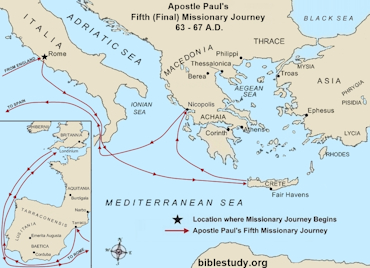According to Adam Clarke's Commentary, the island of Crete was originally settled by people from Palestine. Modern Crete, the largest of Greece's nearly 2,000 islands, has a total area of roughly 3,200 square miles.
Paul found that the believers in the churches of Crete were not organized in a manner that would promote spiritual growth. The Cretan brethren were sorely lacking instruction for conducting themselves in their daily lives as well as their Sabbath assemblies. Unlike the churches in the Gentile regions where Paul had preached, the churches of Crete had no elders to serve as overseers and teachers.
Paul set about to resolve this problem. Paul and Titus traveled from city to city, establishing elders in each local fellowship. Those who were chosen to serve as elders were required to meet the qualifications that were set forth by Paul.

Paul did not remain in Crete long enough to complete the process in every city. After leaving he wrote a letter to Titus (the book we call Titus in the Bible). In this letter, Paul exhorts Titus to be diligent to complete the task they had begun.
I left you in Crete, so that you could put in order the things that still needed doing and appoint church elders in every town (Titus 1:5).
Titus was to see that elders were appointed, or established, in those fellowships that had none. It should be noted that Paul did not confer upon Titus authority to unilaterally choose elders and ordain them by the laying on of hands. The Greek text does not support this radical interpretation and imposition of ecclesiastical tradition.
Paul’s instructions to Titus were not a directive to set up a hierarchical ministry. Rather, as Paul and Barnabas ordained [appointed] elders (Acts 14:23) who had been chosen by the people, so Titus was to do, keeping in mind the proper qualifications.
The establishing of elders in the churches of Crete was completed by Titus exactly as Paul had directed.